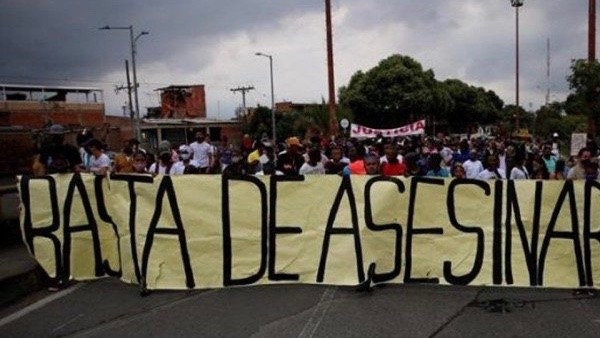The Permanent Peoples’ Tribunal has gone across the world supporting processes for the recognition of truth and uncovering the responsibility of the state with regards to grave human rights violations against people, processes, social and political organizations. In Colombia the TPP is taking place from March 25-27, the third time that the TPP is in the country.
“This tribunal was called for by more than 150 human rights, social and people’s organizations in Colombia in response to the grave crisis and human rights situation suffered in the country. The TPP accepted competence on January 6 and what is taking place now on March 25, 26 and 27 are the sessions or public hearings where more than 50 reports are being presented as witnesses by the prosecutor named for this session in Colombia,” explained Leonardo Jaimes Marín, human rights lawyer and a member of the People’s Legal Team and a member of the Committee to Promote the Permanent Peoples’ Tribunal.
The international judges are overseeing sessions of the Tribunal in the cities of Bogotá, Medellín and Bucaramanga to address the three principal areas of systematic state violence: the process of genocide in Colombia, impunity, and crimes against the 2016 Peace Process.
In the more than 50 reports that will be presented on these three days there are important cases of the victims of genocide in Colombia in all of its dimensions: political, social, cultural, racial, trade union, among others; the majority of which took place in the context of the armed conflict in Colombia.
According to Jaimes, each report will include a concrete case where the systematic historic facts are presented. Among the numerous reports, there are several on the crimes against trade unionism with the specific cases of the Central Union of Workers (CUT), the Workers’ Trade Union (USO), and the National Trade Union of Food Industry Workers (SINALTRAINAL), organizations that have suffered strong repression by State agents and criminal groups that have assassinated, disappeared and tortured leaders and members.
The TPP allows for the State to delegate a defendant to respond to the accusations and victims testimonies from the more than 50 reports.
Another one of the important moments will be the complaints brought forth by the peasant sector, which has prepared eight reports where they present the persecution and extermination against organized rural processes that have had to resist violent State practices. There will also be reports presenting the cases suffered by left political parties, the student movement, Indigenous and Black organizations, the National Prison Movement, and other populations that have historically been victims of the violence of the Colombian state.
“We cannot say that it causes joy that there is a TPP session in Colombia, because what this means is that definitively in Colombia the genocide and the grave violations of human rights is systematic and has been going on for decades despite that two reports have been released with two condemnatory sentences against the state. The ruling elite continues carrying out grave human rights violations,” concluded Jaimes, who also calls for an end to the paradigm of calling State terrorism what is genocide.
#GenocidioPoliticoEs | Que Estado colombiano no reconozca el Genocidio que se hace actualmente contra la @UP_Colombia por acción y omisión.
Es política de eliminación sistemática que vincula a toda la cúpula política que detenta el Poder. pic.twitter.com/orPZiRZI2t
— Congreso de los Pueblos (@C_Pueblos) March 25, 2021
Inauguration in Bucaramanga
On Thursday March 25 the TPP kicked off in the eastern city of Bucaramanga. 15 reports, of the 50, were presented and delegations were present from Catatumbo, Cesar, Sur de Bolívar, Arauca, Casanare, as well as from the Southwest and the Caribbean coast.
The hearings that began in the morning are closed door but are being live streamed by the organizations that have called for the TPP. Following the first day’s session, a massive mobilization was held from the Industrial University of Santander to the Luis Carlos Galán Plaza where a concert was held.
Bucaramanga, like Medellín and Bogotá, has great territorial, political and geographic importance for the Government. According to Olimpo Cárdenas Delgado, spokesperson of the Committee to Promote the Permanent Peoples’ Tribunal, Bucaramanga, “is the heart of the Magdalena Medio region in Colombia, which has suffered perhaps one of the highest levels of violence and presence of armed paramilitary groups. It was there in the Magdalena Medio in Antioquia that paramilitarism was born. Oil exploitation was originally concentrated in the port of Barrancabermeja and then extended to various municipalities across the region. This region was also where several insurgent groups such as the ELN were formed,” he commented.
History of the Permanent Peoples’ Tribunal
The TPP was founded in 1979 in Rome, Italy by Senator Lelio Basso and is defined as a non-conventional tribunal of ethics and opinion that exposes, reflects, and deepens the understanding of the responsibility of the State in the multiple structural violence suffered by nations.
Preceding the TPP is the Russell Tribunal from the 1960s, which addressed the US invasion of Vietnam with a Peoples’ Tribunal that later extended across Latin America to condemn the military dictatorships that disappeared, assassinated, persecuted, criminalized, and tortured people across the region.
From 1989 to 1991 the TPP came to Bogotá to analyze the impunity with regards to crimes against humanity committed by the Colombian state. Fifteen years later, from 2006-2008, the Tribunal returned to Colombia to examine the serious situation of human rights violations by transnational companies that were supported and funded in complicity with the State.
“In Colombia there is a situation of genocide that goes beyond just the assassination or the partial or total extermination of organizations, processes, people in social or popular leadership; but it also has to do with practices of disappearance, torture, threats, criminalization or the arbitrary use of law against the communities and with the desire to exterminate them because they think differently, because they have different visions for society, because they are against the Status Quo,” concluded Cárdenas.





